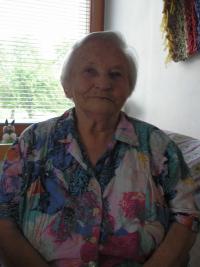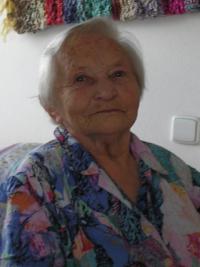And the children Their mums told them we were Czech They shouted at us: Du bist tschechisches Schwein, (that we were Czech pigs) Well, we knew Czech, you see, but they said it in German so that we didn’t understand them
Marie Drnková was born in Újezdec, Strakonice region on October 23rd, 1924. She worked at the smith’s in Blatná, then she was sent to forced labor in the German town Kassel at the beginning of 1944. Due to a shortage of jobs to be done, she was then sent to Pforzheim after only three weeks. There she stayed until March 1945. She fled from Germany back to her country the same month. She worked in the Tesla factory and shortly in the Agriculture Cooperative after the war.


